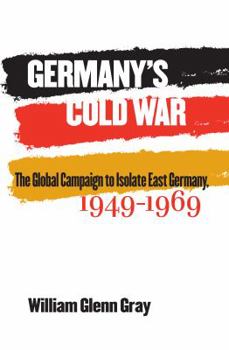Germany's Cold War: The Global Campaign to Isolate East Germany, 1949-1969
(Part of the New Cold War History Series)
Select Format
Select Condition 
Book Overview
Using newly available material from both sides of the Iron Curtain, William Glenn Gray explores West Germany's efforts to prevent international acceptance of East Germany as a legitimate state following World War II.
Unwilling to accept the division of their country, West German leaders regarded the German Democratic Republic (GDR) as an illegitimate upstart -- a puppet of the occupying Soviet forces. Together with France, Britain, and the United States, West Germany applied political and financial pressure around the globe to ensure that the GDR remain unrecognized by all countries outside the communist camp. Proclamations of ideological solidarity and narrowly targeted bursts of aid gave the GDR momentary leverage in such diverse countries as Egypt, Iraq, Ghana, and Indonesia; yet West Germany's intimidation tactics, coupled with its vastly superior economic resources, blocked any decisive East German breakthrough.
Gray argues that Bonn's isolation campaign was dropped not for want of success, but as a result of changes in West German priorities as the struggle against East Germany came to hamper efforts at reconciliation with Israel, Poland, and Yugoslavia -- all countries of special relevance to Germany's recent past. Interest in a morally grounded diplomacy, together with the growing conviction that the GDR could no longer be ignored, led to the abandonment of Bonn's effective but outdated efforts to hinder worldwide recognition of the East German regime.
Unwilling to accept the division of their country, West German leaders regarded the German Democratic Republic (GDR) as an illegitimate upstart -- a puppet of the occupying Soviet forces. Together with France, Britain, and the United States, West Germany applied political and financial pressure around the globe to ensure that the GDR remain unrecognized by all countries outside the communist camp. Proclamations of ideological solidarity and narrowly targeted bursts of aid gave the GDR momentary leverage in such diverse countries as Egypt, Iraq, Ghana, and Indonesia; yet West Germany's intimidation tactics, coupled with its vastly superior economic resources, blocked any decisive East German breakthrough.
Gray argues that Bonn's isolation campaign was dropped not for want of success, but as a result of changes in West German priorities as the struggle against East Germany came to hamper efforts at reconciliation with Israel, Poland, and Yugoslavia -- all countries of special relevance to Germany's recent past. Interest in a morally grounded diplomacy, together with the growing conviction that the GDR could no longer be ignored, led to the abandonment of Bonn's effective but outdated efforts to hinder worldwide recognition of the East German regime.
Format:Paperback
Language:English
ISBN:1469614715
ISBN13:9781469614717
Release Date:March 2014
Publisher:University of North Carolina Press
Length:368 Pages
Weight:1.20 lbs.
Dimensions:1.1" x 6.0" x 9.1"
Customer Reviews
1 rating
a key part of the Cold War elucidated
Published by Thriftbooks.com User , 20 years ago
Gray's book does a masterful job of elucidating a key part of the Cold War. In looking at the Cold War in Europe, historians, both academic and popular/armchair, often overlook what America's allies were doing as they fought their own fronts in the larger Cold War. While NATO allies like Britain, Germany, and Italy were loyal supporters of the U.S., and they played a role in Washington's strategy, they also had their own agendas. Nowhere was this more important than in West Germany. Unlike other American allies in Europe, West Germany had its own "personal" Cold War to fight (against East Germany). In doing so, however, its decisions could impact the larger global conflict between the U.S. and the Soviet Union. Additionally, West Germany was locked in a struggle with its own countrymen, in a sense. The "enemy" were fellow Germans. Using a tremendous array of archival evidence, Gray demonstrates the origins, nuance, and development of West Germany's own Cold War strategy. His bibliography is very impressive. This book is necessary reading for the graduate student or scholar of the Cold War, and it is an excellent choice for the casual reader looking to go beyond the History Channel.





